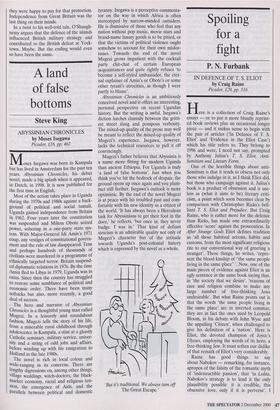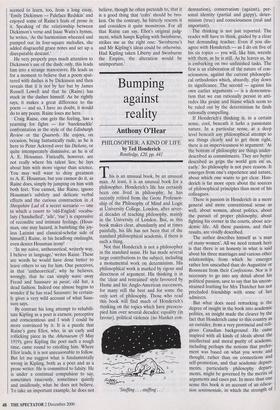Spoiling for a fight
P. N. Furbank
IN DEFENCE OF T. S. ELIOT by Craig Raine Picador, .E20, pp. 516
ere is a collection of Craig Raines essays — or to put it more bluntly reprint- ed book reviews plus an occasional longer piece — and it makes sense to begin with the pair of articles (In Defence of T. S. Eliot' and 'Evidence in the Eliot Case') which his title refers to. They belong to 1996 and were, I need not say, prompted by Anthony Julius's T. S. Eliot, Anti- Semitism and Literary Form.
One of the horrible things about anti- Semitism is that it tends to obsess not only those who indulge in it, as I think Eliot did, but those who campaign against it. Julius's book is a product of obsession and is use- less as (what it aims to be) literary criti- cism, a point which soon becomes clear by comparison with Christopher Ricics's bril- liant T S. Eliot and Prejudice. But Craig Raine, who is rather more for the defence than Ricks, has made one extraordinarily effective 'score' against the prosecution. In After Strange Gods Eliot defines tradition as 'all those habitual actions, habits and customs, from the most significant religious rite to our conventional way of greeting a stranger'. These things, he writes, 'repre- sent the blood kinship of "the same people living in the same place" '. Now, one of the main pieces of evidence against Eliot is an ugly sentence in the same book saying that, in 'the society that we desire', 'reasons of race and religion combine to make any large number of free-thinking Jews undesirable'. But what Raine points out is that the words 'the same people living in the same place' are in inverted commas; they are in fact the ones used by Leopold Bloom, in his debate with John Wyse and the appalling 'Citizen', when challenged to give his definition of a 'nation'. Here is Eliot, the devoted champion of Joyce's Ulysses, employing the words of its hero, a free-thinking Jew. It must soften our dislike of that remark of Eliot's very considerably.
Raine has good things to say about Nabokov — remarking, for instance, apropos of the falsity of the romantic myth of 'indestructible passion', that 'in Lolita, Nabokov's strategy is to lend it the only plausibility possible: it is credible, this obsessive love, only if it is perverse'. I seemed to learn, too, from a long essay, 'Emily Dickinson — Paleface Redskin' and enjoyed some of Raine's feats of prose in it. Speaking of the relationship between Dickinson's verse and Isaac Watts's hymns, he writes, 'As the harmonium wheezed and pumped out its four-square melodies, she added disgraceful grace notes and set up a disreputable descant.'
He very properly pays much attention to Dickinson's use of the dash: only, this leads him into a strange manoeuvre. He leads us for a moment to believe that a poem spat- tered with dashes is by Dickinson and then reveals that it is not by her but by James Russell Lowell and that he (Raine) has stuck in the dashes himself. As he rightly says, it makes a great difference to the poem — and so, I have no doubt, it would do to any poem. Raine loses me here.
Craig Raine, one gets the feeling, has a yearning for fights — for tareknuckle' confrontation in the style of the Edinburgh Review or the Quarterly. He enjoys, on occasion, being fantastically rude, as he is here to Peter Ackroyd over his Dickens, or quite intemperately dismissive, as he is of A. E. Housman. Fisticuffs, however, are not really where his talent lies; he lays about him with more vigour than science. You may well want to deny greatness to A. E. Housman, but you cannot do it, as Raine does, simply by jumping on him with both feet. You cannot, like Raine, ignore Housman's subtlety and delicate verbal effects and the curious construction in A Shropshire Lad of a secret scenario — one in which a resort to 'old-English' vocabu- lary (handselled', 'ails', 'rue') is expressive of recondite and intimate feelings. (Hous- man, one may hazard, is banishing the joy- less Latinist and classical-scholar side of himself.) Raine, in his headlong onslaught, even denies Housman irony!
'In my naive, untheoretical, writerly way, I believe in language,' writes Raine. These are words he would have done better to leave others to say for him. One perceives, in that `untheoreticar, why he believes, wrongly, that he can simply wave away Freud and Saussure as passe, old hat, a dead fashion. Indeed one almost begins to wonder if he has read Saussure: he certain- ly gives a very wild account of what Saus- sure says.
By contrast his long attempt to rehabili- tate Kipling as a poet is earnest, perceptive and conscientious and I wish I could be more convinced by it. It is a puzzle that Raine's guru Eliot, who, in an early and rollicking piece in the Athenaeum (9 May 1919), gave Kipling the poet such a rough time, came round to extolling him. Where Eliot leads, it is not unreasonable to follow. But let me suggest what is fundamentally wrong in Kipling, both as a poet and as a prose writer. He is committed to falsity. He is under a continual compulsion to say, sometimes raucously, sometimes quietly and insidiously, what he does not believe. To take an important example, he does not believe, though he often pretends to, that it is a good thing that 'colts' should be bro- ken. On the contrary, he bitterly resents it and considers it quite monstrous. For all that Raine can say, Eliot's original judg- ment, which lumps Kipling with Swinburne, strikes me as the right one: `Swinburne's and Mr Kipling's ideas could be otherwise. Had Kipling taken Liberty and Swinburne the Empire, the alteration would be unimportant.'



















































































 Previous page
Previous page